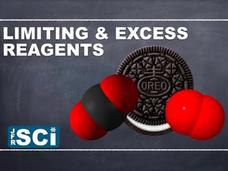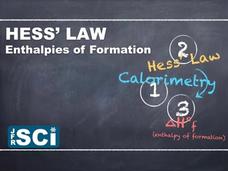Curated Video
Calculating and Measuring Chemical Reaction Rates
The video discusses the concept of the rate of a chemical reaction and how it can be calculated and expressed in various ways. The examples used in the video include measuring the amount of product formed or reactant used up over a...
Ancient Lights Media
Comparing Photosynthesis and Aerobic Cellular Respiration
Plant Physiology and Chemistry Set: 9. Using simple chemical equations this clip explains the complimentary nature of photosynthesis and aerobic respiration.
FuseSchool
Collision Theory & Reactions - Part 2
In Part 2, learn the basics about Collision Theory and Reactions. Different reactions can happen at different rates. What is a collision theory and how does it relate to reactions? Find out more in this video!
FuseSchool
Chemical Equations
Chemical equation shows the overall chemical change of reactants into products. It's a bit like a detailed cooking recipe, but where all the ingredients and all the products are written down, even the ones you can't necessarily see. The...
Catalyst University
Real Gas Behavior | Fugacity & Equilibrium
Fugacity can be related to the equilibrium constant just like pressure. In this video, we derive an expression for the Kf (fugacity equilibrium constant) using Kp and the fugacity coefficients.
Curated Video
Catalysts and Enzymes: Enhancing Chemical Reactions
This video explains catalysts, exploring the concept of activation energy and how catalysts can lower it to speed up reactions. The video covers the use of catalysts in industry and domestic applications, including the catalytic...
Professor Dave Explains
IIT/JEE Chemistry Practice #26: Enthalpy of Combustion
Practice REAL problems from actual past IIT/JEE exams with Professor Dave!
Curated Video
Visualizing Energy Changes in Chemical Reactions through Reaction Profiles
The video discusses how diagrams of reaction profiles can be used to show the energy changes that occur during chemical reactions. It explains the concept of energy conservation in chemical reactions and how the transfer of energy to or...
FuseSchool
What Are Catalysts?
Learn the basics about Catalysts. What are catalysts? How do catalysts work? Using catalysts in industry? Find out more in this video!
FuseSchool
Rates of Reactions - Part 1
In this video you are going to learn what the reaction rate is and some ways of measuring reaction rate. Reaction rate is a measure of how quickly the reactants in a reaction change into the products of the reaction. The rate of a...
Professor Dave Explains
Kinetics: Initial Rates and Integrated Rate Laws
Who likes math! Oh, you don't? Maybe skip this one. Unless you have to answer this stuff for class. Then yeah, watch this.
Curated Video
Exothermic and Endothermic Reactions: Experiments and Definitions
The video is a lecture presentation on exothermic and endothermic reactions. The presenter explains the definitions of these reactions and demonstrates two experiments to determine whether a reaction is exothermic or endothermic. The...
Mazz Media
Chemical Reactions
This video defines what a chemical reaction is and explains how chemical reactions obey the law of conservation of matter. Students will see real world examples of chemical reactions and come to understand that no matter is created or...
FuseSchool
Structure Of The Leaf
Plants make food through photosynthesis. Using their leaves, plants combine sunlight, carbon dioxide and water to make glucose and oxygen. A leaf is like a plant's food factory, collecting all of the components into one place so that...
Mazz Media
Signs of Chemical Reactions
Through real world examples, students will come to understand that chemical reactions cause reactants to undergo changes, so the products have different properties. Viewers will learn about single displacement and double displacement...
FuseSchool
What Are Endothermic & Exothermic Reactions
An exothermic reaction gives off energy to the surroundings; like a fire giving off heat. An endothermic reaction takes in energy from the surroundings; like a snowman melting. Exothermic reactions transfer energy to the surroundings,...
Professor Dave Explains
Chemical Equilibria and Reaction Quotients
Many chemical reactions don't just go one way, they go forwards and backwards. Once there is balance between the two, this is an equilibrium. And we need to be able to predict how much stuff there will be at equilibrium! Get ready to...
FuseSchool
What Is The Law of Conservation of Mass
Learn the basics about the law of the conservation of mass, when learning about properties of matter. The Law of Conservation of Mass says that in chemical reactions no matter is lost or gained. The law of conservation of mass means that...
Visual Learning Systems
Reactions: Chemical Reactions in Action
Chemicals interacting with each other are one of the most fascinating topics in chemistry. Fireworks, burning flares, and rusting all illustrate chemical reactions. The different types of reactions are described, as well as the process...
JFR Science
Limiting and Excess Reagents
Sometimes things are just left over. An informative video in the JFR Science series highlights limiting and excess reactants in a chemical reaction. It explains the process of solving stoichiometry problems with limiting reactants.
JFR Science
Hess' Law: Enthalpies of Formation
Tired of long, tedious enthalpy calculations? Look no further than Hess' Law! Young chemists discover a shortcut using changes in enthalpy with a video from JFR Science. The narrator talks about the theory behind the law, then performs...
JFR Science
Introduction to Rates of Reaction
Why are rates of reaction so important? Discover the answer to this, and many other questions, through a video from JFR Science. Pupils examine how, through the balanced chemical equation and experimentation, they can determine how fast...
JFR Science
Rate Law: Intro to Reaction Order
How does concentration affect the rate of reaction? Introduce chemistry scholars to the concept of reaction order using a well-written video from JFR Science. The narrator explains unfamiliar variables, shows reaction orders as graphs,...




